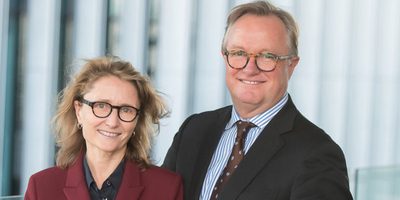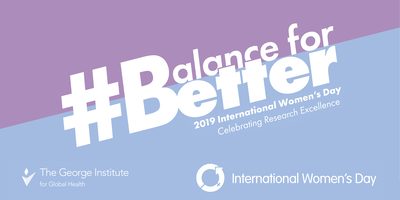
Robyn Norton: International Women's Day 2019 Profile
Robyn Norton began conducting research on how best to prevent and manage injuries 30 years ago. Her passion and dedication to improving the health of communities globally led her to establish The George Institute for Global Health 20 years ago.
Robyn first became interested in the burden of injuries while completing her PhD, which examined the relationship between alcohol and liver disease in women.
“As I continued exploring the relationship between alcohol as a risk factor for disease and injuries, I became more interested in addressing the burden of injuries per se, partly because the same scientific methods that had been used to better understand other diseases had not been used in the injury field.”
Robyn established and led an Injury Prevention Research Centre for the next 10 years, applying the same epidemiological methods used in other diseases, to improve understanding of the causes and how best to prevent and manage injuries.
During this time, she increasingly began to engage with colleagues in low and middle-income countries and realised that injuries, and in particular road traffic injuries, were beginning to be significant causes of death and disability in these countries.
“While I had applied my methodological expertise to look broadly at injuries, there seemed real value in starting to work with colleagues in low and middle-income economies to expand our understanding of injuries in those countries.”
Concurrently, Robyn’s fellow co-founder of The George Institute, Stephen MacMahon, was running a Clinical Trials Research Unit, focused on addressing the burden of cardiometabolic diseases.
“Pragmatically, we recognised that we could combine forces to economise on support groups like administration, IT, finance etc. But more importantly, we realised that the disease burden in low and middle-income countries was changing from a focus on infectious diseases, maternal and child health, to the emergence of an epidemic of non-communicable diseases and injuries.”
“So, it made a lot of sense for us to join forces and establish The George Institute, to together focus on addressing the growing burden of non-communicable diseases and injuries, especially in low and middle-income countries.”
Looking ahead, Robyn wants to see the Institute continue to increase its impact on global health.
“Over the last 20 years, we’ve grown from three people sitting in a single office in Sydney, to offices in four countries and close to 700 staff and team members, all passionate and committed to reducing the burden of death and disability worldwide.”
“While I’m incredibly proud of all that we’ve been able to achieve, there’s still a lot more to be done. I would like to see us continue to grow in both size and influence, and continue to produce really good research. I’d also like to see us increase our impact on policy and practice, ultimately leading to further significant improvements in human health.”
In terms of the global medical research agenda, Robyn would like to see greater recognition of the importance of better understanding disease burdens among woman.
“I’d like to see more research around the world using data disaggregated by sex and gender to better understand how best to prevent and manage non-communicable diseases and injuries in women (and men).”
To ensure better gender balance in the research sector, Robyn believes we should take a similar approach to that used when conducting research.
“We first need to understand and document what the problem is, identify which factors could lead to change, and then implement solutions. It’s what we have done and continue to do at The George – apply a systematic approach to understanding where there are gender imbalances and then implementing measures to address these issues.”
“Quite frankly, when looking at the research sector as a whole, it's going to require us to implement hard targets. Unless we do that, I'm sure it's going to take too long.”
Robyn says that employers need to create supportive environments that allow women to really grow on their own terms and make their own life choices without feeling their careers are threatened.
“I feel very fortunate to have been able to achieve what I have while also having a family. When I started having a family, I was able to access childcare, I worked for an organisation that allowed me to manage my work flexibly, and I had a supportive partner who helped me.”
“I feel that I've been able to build similar workplace support structures here at The George. I'm very proud of that fact but in a way I shouldn't be - it should be something that all work environments allow.”
Robyn feels very fortunate to have chosen to work in medical research, and hopes many more women seek a career in the sector.
“We get up and go to work every day knowing that what we're doing is improving the health, and frankly the lives, of millions of people worldwide. Not many people work in an environment where they can do that, so I feel really privileged that I have a job that allows me to contribute to making the world a better place.”
Reflecting on this year’s International Women’s Day theme, #Balanceforbetter, Robyn says that there needs to be equal gender representation in senior management.
“I would like to be increasingly in an environment where there are as many women at the top of the tree as there are men. Unfortunately, that's still not the case.”
“However, all the evidence suggests that having balance in terms of gender leads to better research, and better health outcomes.”
Read more from Robyn on Twitter at @RobynNorton8




